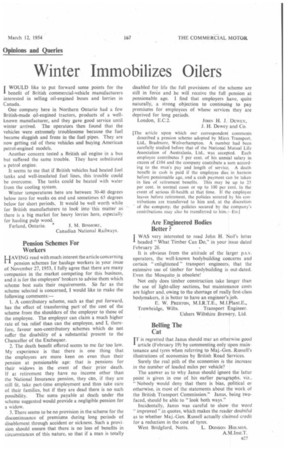Winter Immobilizes Oilers
Page 61

If you've noticed an error in this article please click here to report it so we can fix it.
I WOULD like to put forward some points for the I benefit of British commercial-vehicle manufacturers interested in selling oil-engined buses and lorries in Canada.
One company here in Northern Ontario had a few British-made oil-engined tractors, products of a wellknown manufacturer, and they gave good service until winter arrived. The operators then found that the vehicles were extremely troublesome because the fuel became sluggish and froze in the fuel pipes. They are now getting rid of these vehicles and buying American petrol-engined models.
Another concern tested a British oil engine in a bus but suffered the same trouble. They have substituted a petrol engine.
It seems to me that if British vehicles had heated fuel tanks and well-insulated fuel lines, this trouble could be overcome. The tanks could be heated with water from the cooling system.
Winter temperatures here are between 30-40 degrees below zero for weeks on end and sometimes 65 degrees below for short periods. It would be well worth while for British manufacIttters to look into this matter as there is a big market for heavy lorries here, especially for hauling pulp wood.
Ferland, Ontario. • J. M. BINMORE,
Canadian National Railways.
Pension Schemes For Workers
HAVING read with much interest the article concerning pension schemes for haulage workers in your issue of November 27, 1953, I fully agree that there are many companies in the market competing for this business, and it is for the employers' brokers to advise them which scheme best suits their requirements. SO far as the scheme selected is concerned, I would like to make the following comments:
1. A contributory scheme, such as that put forward, has the effect of transferring part• of the cost of the scheme from the shoulders of the employer to those of the employee. The employer can claim a much higher rate of tax relief than can the employee, and I, therefore, favour non-contributory schemes which do not suffer the disability of a substantial present to the Chancellor of the Exchequer.
2. The death benefit offered seems to me far too low. My experience is that there is one thing that the employees are more keen on even than their pension at pensionable age: that is pensions for their widows in the event of their prior death. If at retirement they •have no income other than the National Insurance pension, they can, if they are still fit, take part-time employment and thus take care of their families, but if they are dead there is no such possibility. The sums payable at death under the scheme suggested would provide a negligible pension for a widow.
3. There seems to be no provision in the scheme for the discontinuance of premiums during long periods of disablement through accident or sickness. Such a provision should ensure that there is no loss of benefits in circumstances of this nature, so that if a man is totally disabled for life the full provisions of the scheme are still in force and he will receive the full pension at pensionable age. I find that employers have, lune naturally, a strong objection to continuing to pay premiums for employees of whose services they are deprived for long periods.
London, E.C.2. JOHN H. J. DEWEY,
J. H. Dewey and Co.
(The article upon which our correspondent comments described a pension scheme adopted by Miers Transport, Ltd., Bradmore, Wolverhampton. A number had been carefully studied before that of the National Mutual Life Association of Australasia, Ltd., was accepted. Each employee contributes 5 per cent, of his annual salary in excess of £104 and the company contribute a sum according to the man's pay and length of service. A death benefit in cash is paid if the employee dies in harness before pensionable age, and a cash payment can be taken in lieu of retirement benefits. This may be up to 25 per cent, in normal cases or up to 100 per cent, in the event of serious ill-health at that time. If the employee leaves before retirement, the policies secured by his contributions are transferred to him and, at the discretion of the-company, the policies secured by the company's contributions may also be transferred to him.—Eu.)
Are Engineered Bodies Better ?
WAS very interested to read John H. 'Neil's letter I headed "What Timber Can Do," in your issue dated February 26.
It is obvious from the attitude of the larger p.s.v. operators, the well-known bodybuilding concerns and certain " enlightened" transport engineers, that the extensive use of timber for bodybuilding is out-dated. Even the Mosquito. is obsolete!
Not only does timber construction take longer than the use of light-alloy sections, but maintenance costs are higher and, owing to the shortage of really first-class bodyrnakers, it is better to have an engineer's job.
E. W. PRESTON, M.I.R.T.E., M.I.Plant.E.,
Trowbridge, Wilts, Transport Engineer. Ushers Wiltshire Brewery, Ltd.
Belling The Cat
I T is regretted that Janus should mar an otherwise good article (February 19) by commenting only upon maintenance and tyres when referring to Maj.-Gen. Russell's illustrations of economies by British Road Services. Surely the real pith of the economies is the increase in the number of loaded miles per vehicle?
The answer as to why Janus should ignore the latter point is given in one of his earlier paragraphs, viz., "Nobody would deny that there is bias, political or otherwise, in most of the statements about the work of the British Transport Commission." Janus, being twofaced, should be able to "look both ways."
Incidentally, Janus was careful to show the word "improved "in quotes, which makes the reader doubtful as to whether Maj.-Gen. Russell actually claimed credit for a reduction in the cost of tyres.
West Bridgford, Notts. L. DONSON HOLMES,




































































































